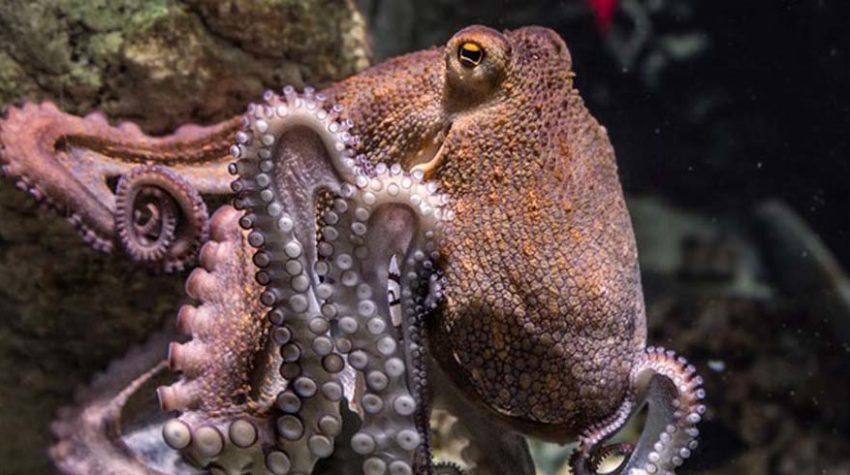
June 24, 2020Animal Law & Policy ClinicClinic petitions National Institutes of Health to protect octopuses
The NIH’s current policy that defines which animals are entitled to be handled humanely excludes all invertebrates, including cephalopods. However, because of their extraordinary brains, these animals–particularly octopuses–are increasingly the focus of much federal-funded research.
The Animal Law & Policy Clinic has petitioned the National Institutes of Health (NIH) to include cephalopods—octopus, squid and cuttlefish—among the animals entitled to humane treatment by those involved in federally funded research.
The Clinic is representing the New England Anti-Vivisection Society (NEAVS), a non-profit dedicated to ending animal suffering caused by research, and a coalition of other organizations and well-known cephalopod scientists from the United States and across the world.
“Octopus and other cephalopods are the smartest and most fascinating invertebrates in the world. They easily learn tasks, remember faces, are masters of escape, and have been around since at least the time of the dinosaurs. That we don’t give them even the most basic legal protections afforded to other animals under law simply because they don’t have a backbone is absurd,” said Nathan Herschler, executive director of NEAVS.
Cephalopods are sentient beings who, like many other animal species, have the capacity to suffer. Many experiments on cephalopods may cause them to feel pain, such as by depriving them of food, conducting invasive neuroscience research, shocking them with electric prods, or subjecting them to inappropriate housing and care.
The NIH’s current policy that defines which animals are entitled to be handled humanely excludes all invertebrates, including cephalopods. However, because of their extraordinary brains, these animals–particularly octopuses–are increasingly the focus of much federal-funded research. NIH-funded institutions are at the forefront of cephalopod research in the US. From 1978 until 2010 the National Resource Center for Cephalopods in Texas dominated such research. Currently, the Marine Biological Laboratory in Massachusetts has taken over as NIH’s largest supplier, and possibly largest utilizer, of such animals in conducting research.
NIH’s current exclusion of cephalopods from the definition of “animals” entitled to humane treatment is at odds with the legislative history of the Health Research Extension Act of 1985, the legislation that gave the NIH authority to establish guidelines for the proper treatment of animals used in research in laboratories that it funds.
Clinical Fellow Kate Barnekow, who worked on the Petition along with Harvard Animal Law School Clinic Director Katherine Meyer, explains: “Congress intended to protect all animals—not only vertebrates. It wasn’t until after the legislation was introduced that the NIH decided to restrict the meaning of the word ‘animal’ to mean, quite literally, ‘not all animals.’”
The United States also lags well behind other countries in this respect; the United Kingdom, Canada, New Zealand, Australia and the European Union all include cephalopods within their animal welfare legislation.
The Petition asks NIH to amends its existing policy to include cephalopods in the definition of animal and to develop appropriate standards for the humane handling of all such animals in all federally funded research. NEAVS co-petitioners include the American Anti-Vivisection Society; The Physicians Committee for Responsible Medicine; The Humane Society of the United States; Humane Society Legislative Fund; Jennifer Jacquet, PhD; Becca Franks, PhD; Judit Pungor, PhD; Jennifer Mather, PhD; Peter Godfrey-Smith, PhD; Lori Marino, PhD; Gregory J. Barord, PhD; Carl Safina, PhD; Heather Browning; and Walter Veit.
